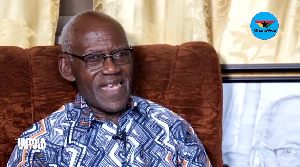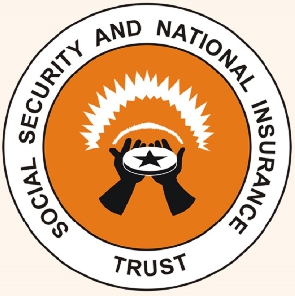- Home - News
- TWI News | TV
- Polls
- Year In Review
- News Archive
- Crime & Punishment
- Politics
- Regional
- Editorial
- Health
- Ghanaians Abroad
- Tabloid
- Africa
- Religion
- Election 2020
- Coronavirus
- News Videos | TV
- Photo Archives
- News Headlines
- Press Release
General News of Saturday, 12 May 2007
Source: Statesman
Statesman: Aidoo Admits
TONY AIDOO ADMITS TO BREACHING UK IMMIGRATION RULES
Wednesday, on the second day of his libel trial against former publishers of The Statesman, Kinesic Communications Ltd, and the paper’s Editor-in-Chief, Asare Otchere-Darko, firebrand politician Joe Tony Aidoo was forced to admit on a few occasions that he breached British immigration rules.Confronted with the evidence before the court, he admitted to travelling to the United Kingdom in August 2002 on a visitor’s visa, after being granted admission to study for the Post Graduate Diploma in Law at the College of Law, London.Under cross examination by Nana Bediatuo Asante, Dr Tony Aidoo further admitted that he started the law diploma course, which he completed in June 2003, before applying for a variation of his visa, an application that was refused in June 2003, forcing him to return to Ghana.
He is suing the two defendants over a publication of October 2003 that he was “deported” from the United Kingdom for breaching that country’s immigration rules. Tuesday, he told the court that he was “very, very traumatised,” by the publication.
But, Wednesday, the defence sought to discredit the plaintiff by showing that, even though he travelled to the UK on a multiple visa, Dr Tony Aidoo caused a multiple breach of UK immigration rules by first deceiving the UK immigration officer in Accra as to the real purpose of his visit; by overstaying his visa and by breaching his visa which did not allow him to switch from a visitor to a student.
The former Deputy Defence Minister under the NDC could even be heard getting his calculation wrong on the difference between two years and three years. He’d told the court that his passport had a 3-year multiple visitor’s visa, giving the dates as from “June 2001 to June 2003.”
Defence lawyer asked: “That would be a period of 2 years would it not? Dr Aidoo: “No it’s counted first year 2001, second year 2002, third year 2003.
Q: I’m suggesting to you Mr [sic] Aidoo that the period of validity is 2 years – 20 June 2001 to 20 June 2002, one year, 20 June 2002 to 20 June 2003, two years.
A: You may be correct.
Q: So you agree?
A: If you calculate it monthly. [His lawyer prompts him to concede]. It was a mistake on my part.
Dr Tony Aidoo had first told the court that he stayed continually in the UK from August 2002 to June 2003. This prompted the defence lawyer to probe further:
Q: When you arrived in the UK in August 2002 how many months leave to enter were you granted?
A: 180 days. And, this 180 days is stated in the visa and the visa says multiple re-entering.
Q: Are you aware that the 180 days mentioned is only the maximum you are allowed to stay on any given trip?
A: If you say so. Judge: Dr, the question is very simple. Either you are aware or not aware.
A: I’m aware that some visas are for that maximum and some for other periods.
Q: But, you would agree that if it says 180 days, that’s the maximum?
A: That’s the maximum. My lord, that’s the maximum only in terms of the entry.
J: What do you mean?
A: When you enter you have a maximum of 6 months or 180 days. But that doesn’t exhaust the validity of the visa.
Q: When did you apply to the College of Law?
A: I can’t remember the exact date but I think it was somewhere in June or July 2002.
Q: What course or degree did you apply for?
A: I applied for the Post Graduate Diploma in Law
Q: When did you gain admission to the College of Law?
A: I can’t remember the exact date. But when I got to London in August 2002, an admission letter was waiting for me.
Q: When did you apply to Lincoln’s Inn?
A: Somewhere in March 2003, not too sure of the date.
Q: You did take the College of Law course, didn’t you?
A: Yes I did.
Q: When did you graduate from the College of Law?
A: Just before the expiration of my visa, June 2003.
Q: You testified that you took the College of Law course and graduated in June 2003?
A: That’s true my lord.
Q: Were you granted a variation of your visa to enable you read for the law course?
A: No, my lord. But, I did apply for a variation in December 2002
Q: And, without the grant of the variation you went ahead and took that course, is that correct?
A: I had both a valid entry and resident permit.
Q: Isn’t it a fact that subsequent to this application for variation in November 2002 you made another application in June 2003?
A: It was for the same variation. I was expecting a response from the Home Office up to the point where there was the need to apply for an extension on the duration of my visa. On that form I gave two principled reasons for the application: the need to go out of the country and I’ve had this offer to read for the Bar
Q: Mr [sic] Aidoo, I’m putting it to you that the testimony you have given is false.
A: It’s not false
Q: You received a letter from the Home Office which refused your application for variation?
A: That’s not correct. It’s not correct that I received a refusal for application. I was refused permission to apply. The Home Office said I was not entitled to apply. [Here, Dr Aidoo was made to read the first paragraph of a refusal letter dated June 16, 2003 which confirmed that his application was indeed refused]
Q: I’m putting it to you that your application for variation was refused in the letter dated 16th June, what do you have to say to that?
A: My lord, if the heading is read literally, then I was refused.
Q: Just say yes
A: Yes
The case has been adjourned to Monday 21 May, Beach High Court 20.










